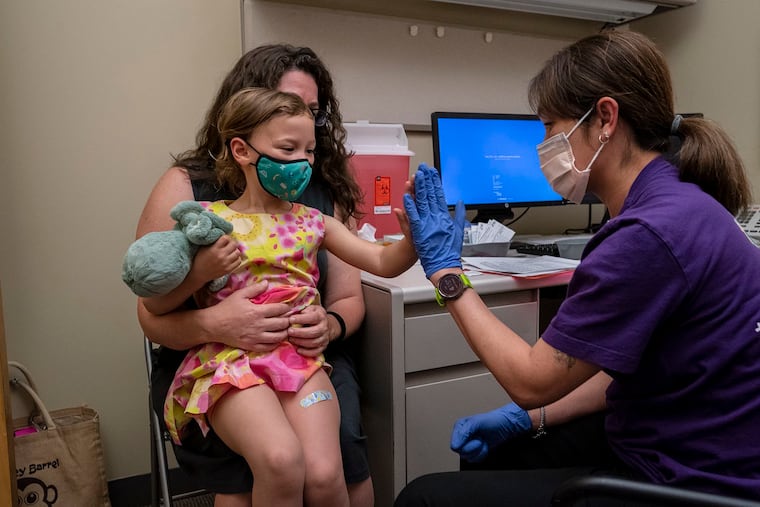The CDC is recommending that COVID-19 vaccines become routine for kids and adults
CDC updates vaccination guidance for children and adults to include COVID-19.

Pediatricians and federal health experts have been recommending that children and teens get vaccinated against COVID-19 since the shots first became available.
Now, the nation’s public health agency is recommending the shots become routine. On Thursday, the U.S. Centers for Disease Control and Prevention formally added COVID-19 vaccinations to its immunization schedules for children and adults. That means it will appear on the list of recommended childhood vaccinations, along with other shots, such as polio, chickenpox and measles, mumps, and rubella.
The CDC’s updated 2023 vaccination schedule doesn’t mandate COVID-19 shots and boosters, although local health departments in Pennsylvania and New Jersey look to the CDC for guidance on which vaccines are required for kids to attend schools. Some of the shots on the CDC’s recommended list, such as the annual flu vaccine, are not required for school.
COVID-19 vaccination rates among young children, ages 6 months to 4 years, have remained low in the United States. In Pennsylvania, only 16% of kids in that age group have received an initial dose as of Feb. 1, compared with 11% in New Jersey, according to a new report by the American Academy of Pediatrics.
All states have medical exemptions for some vaccines, and many states consider exemptions for religious or philosophical reasons.
The CDC recommends that children 6 months and older, as well as adults, receive two doses of a COVID-19 vaccine and a third dose of a “bivalent” booster shot, which protects against two strains of the virus that causes coronavirus.
The update comes after the CDC’s Advisory Committee on Immunization Practices, which meets annually to review the vaccination schedule and make any changes, voted this past October to add the COVID-19 vaccine to the schedule for children and adults. Also in October, the U.S. Food and Drug Administration cleared the way for children as young as 5 to get a bivalent COVID-19 booster shot. Previously, the boosters were only available to older kids and teens.
As authorities urge people to get COVID vaccines as a new normal, the public health emergency declared for the pandemic is coming to an end in May. This means COVID-19 vaccines will no longer be free for all Americans.
However, the updated CDC schedule means COVID-19 shots will be included in the federal Vaccines for Children Program, which provides free vaccines for children who are eligible for Medicaid, un- or underinsured, or are part of the nation’s Indigenous population.
Readers can stay informed about current COVID-19 case numbers and hospitalizations in New Jersey, Pennsylvania, and Philadelphia by visiting these websites:
For Pennsylvania and Philadelphia data: https://www.health.pa.gov/topics/disease/coronavirus/pages/cases.aspx
For New Jersey data: https://www.nj.gov/health/cd/topics/covid2019_dashboard.shtml